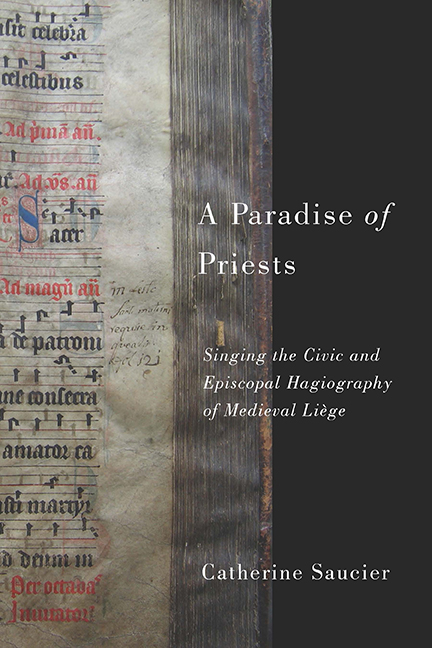Book contents
- Frontmatter
- Dedication
- Contents
- List of Illustrations
- Acknowledgments
- Abbreviations
- Note on Editorial Conventions
- Introduction: The Sound of Civic Sanctity in the Priestly Paradise of Liège
- 1 Martyred Bishops and Civic Origins: Promoting the Clerical City
- 2 The Intersecting Cults of Saints Theodard and Lambert: Validating Bishops as Martyrs
- 3 The Civic Cult of Saint Hubert: Venerating Bishops as Founders
- 4 Clerical Concord, Disharmony, and Polyphony: Commemorating Bishop Notger's City
- 5 Military Triumph, Civic Destruction, and the Changing Face of Saint Lambert's Relics: Invoking the Defensor Patriae
- Conclusion: Hearing Civic Sanctity
- Appendix: Service Books Preserving the Medieval Chant Repertory Sung in the City of Liège
- Notes
- Bibliography
- Index
Introduction: The Sound of Civic Sanctity in the Priestly Paradise of Liège
Published online by Cambridge University Press: 15 March 2018
- Frontmatter
- Dedication
- Contents
- List of Illustrations
- Acknowledgments
- Abbreviations
- Note on Editorial Conventions
- Introduction: The Sound of Civic Sanctity in the Priestly Paradise of Liège
- 1 Martyred Bishops and Civic Origins: Promoting the Clerical City
- 2 The Intersecting Cults of Saints Theodard and Lambert: Validating Bishops as Martyrs
- 3 The Civic Cult of Saint Hubert: Venerating Bishops as Founders
- 4 Clerical Concord, Disharmony, and Polyphony: Commemorating Bishop Notger's City
- 5 Military Triumph, Civic Destruction, and the Changing Face of Saint Lambert's Relics: Invoking the Defensor Patriae
- Conclusion: Hearing Civic Sanctity
- Appendix: Service Books Preserving the Medieval Chant Repertory Sung in the City of Liège
- Notes
- Bibliography
- Index
Summary
Laetare et lauda Deum Legia,
De patroni tui Lamberti presentia,
Cujus sanguine consecrari,
Cujus corpore ditari meruisti.
[Rejoice and praise God, Liège,
for the presence of your patron Lambert!
By whose blood [you merited] to be sanctified,
by whose body you merited to be enriched.]
—Second Vespers Magnificat AntiphonWhen cantor Henry of Palude intoned the Antiphon Laetare et lauda before the entire clerical community of Liège, the melodious sound of his voice was the sole musical accompaniment to an extraordinary ritual—the nude display of Saint Lambert's skull. With this plainchant, the cantor and his choir simulanteously invoked the symbolic protection of the patron of the diocese and the martyred bishop-saint's real presence. Only under exceptional circumstances, as at this ceremony in 1489, did cathedral clerics open the saint's reliquary to publicly exhibit his bare bones. Yet, rather than herald the martyr's cranial relic, the cantor and choristers acclaimed instead the city, Legia, sanctified by the saint's body. Why did these singers equate Saint Lambert with the saintly personification of Liège? And what was the origin of this association between saint and city?
The symbiosis of saintly and civic merit voiced so outspokenly in Laetareet lauda constitutes a recurring, yet seldom heard, theme in clerical writing on medieval Liège. Like other musical acclamations to Legia, the Antiphon Laetare et lauda finds its linguistic and ideological origins in the deeds of saints (vitae sanctorum) and bishops (gesta episcoporum) that were recorded by clergymen affiliated with the myriad ecclesiastical institutions of the city and diocese. Some of the region's most famed hagiographers and historians—Bishop Stephen of Liège (r. 901–20), Abbot Heriger of Lobbes (r. 990–1007), Abbot Lambert of Saint Lawrence (r. ca. 1060–70) and monk Sigebert of Gembloux (ca. 1030–1112)—also composed or compiled liturgical music. Yet with the exception of Bishop Stephen's tenth-century Office for Saint Lambert, the chant and devotional polyphony honoring the city's saintly bishops, alongside the city itself, have failed to attract the attention lavished on their literary counterparts.
Our present ignorance about the city's saintly episcopal music contradicts its pervasive resonance and relevance throughout the Middle Ages.
- Type
- Chapter
- Information
- A Paradise of PriestsSinging the Civic and Episcopal Hagiography of Medieval Liège, pp. 1 - 10Publisher: Boydell & BrewerPrint publication year: 2014

